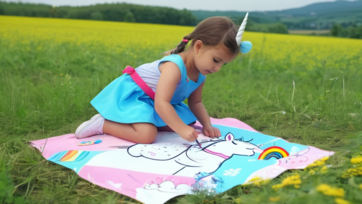Teaching Good Habits to Children
As parents, one of our most important roles is to instill good habits in our children that will last a lifetime. From hygiene to kindness, these habits form the building blocks of a child’s character and future success. But how do we teach these habits in a way that sticks? The key is consistency, patience, and making the process enjoyable and relatable for children. When good habits are integrated into their daily routine in a positive way, children learn to embrace them naturally.
Morning routines – starting the day right
One of the best ways to set the stage for good habits is by establishing a consistent morning routine. Children thrive on structure, and a clear morning routine helps them understand what’s expected of them each day. Start with simple tasks like brushing their teeth, washing their face, and getting dressed. Make it fun by turning these tasks into a game or a song. For example, you can sing a “brushing teeth” song to make the activity more enjoyable and less of a chore.
This structured start to the day sets the tone for the rest of their activities and teaches children the importance of taking care of themselves. It also helps them understand that every day begins with a fresh start, where they can make positive choices and practice their good habits.
Clean up time – taking responsibility for their space
Teaching children to clean up after themselves is a crucial habit that fosters responsibility and care for their environment. One way to make tidying up fun is by turning it into a game. You can set a timer and challenge them to put their toys away before the time runs out, or you can reward them with a sticker or small treat when they’ve done a great job.
Involving them in household chores not only teaches them the importance of maintaining a clean space but also shows them that everyone in the family contributes to the well-being of the home. This helps build a sense of teamwork and responsibility.
Healthy eating – making good food choices
Developing healthy eating habits early on is vital for a child’s growth and well-being. Children may naturally gravitate toward sugary treats or snacks, but it’s important to guide them in making balanced food choices. One fun way to teach healthy eating is by involving children in the cooking process. Let them help with meal preparation by washing vegetables, stirring ingredients, or setting the table.
As you prepare meals, talk about the benefits of each food group – how fruits and vegetables give them energy, how proteins help their muscles grow, and how whole grains keep them feeling full and focused. You can also make eating healthy fun by arranging foods into creative shapes or patterns on their plate, encouraging them to see nutritious food as exciting and delicious.
Sharing and kindness – building social habits
Teaching children the importance of sharing and kindness is essential for their social development. These habits help children build meaningful friendships, resolve conflicts, and contribute to a harmonious environment, both at home and in school. One of the best ways to teach these habits is by modeling the behavior yourself. Children learn by watching their parents, so demonstrate kindness and generosity in your daily interactions.
Another effective approach is through role-playing games where your children practice sharing with their siblings or friends. You can also use stories or cartoons that highlight the value of kindness and ask your child how they would handle similar situations. By reinforcing the idea that sharing makes everyone happier and more connected, children naturally begin to adopt these positive social habits.
Bedtime routines – winding down the day
A healthy bedtime routine is just as important as a productive morning routine. Having a consistent bedtime routine helps children develop the habit of winding down, which is essential for their mental and physical well-being. Start with quiet activities like reading a bedtime story, taking a warm bath, or listening to calming music. This prepares their mind and body for sleep and creates a peaceful atmosphere.
Bedtime routines also provide an opportunity to reflect on the day. You can talk to your child about what they enjoyed during the day, what they learned, and how they practiced their good habits. This reflection reinforces the importance of those habits and encourages them to continue practicing them in the days ahead.





